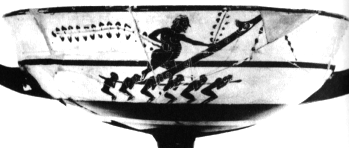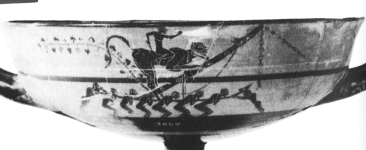Introduction
We harvested the grapes at that time of the year when the Eleusinian
Mysteries are held (c. Sep 29 - Oct 5), in that month when the Divine
Child Dionysos was snatched from the womb of Semele (who is also
Persephone), where He had been for seven months, since the time of the
Lesser Mysteries at Agrai (late Feb.), when He was conceived. After
Zeus had snatched the Divine Child from Semele's womb, the Father sewed
Dionysos into His thigh, and He became the Sewed-in God
(Eiraphiôtês).
So also have we enclosed the crushed grapes in jugs, which we have
placed in the Earth, so the grapes might lie hidden and protected until
the wine is ready to emerge from the Earth and see the light of day.
Remember how, in the third quarter of the month Puanepsiôn (beginning
of Nov.), when the Pleiades first rose, we called Dionysos Limnaios,
Dionysos in the Swamps, at the place where springs erupt from the
ground, the very place where He descended into the Underworld. We went
there when the wine had fermented for forty days. Although its
fermentation was not complete, we brought it to the sanctuary, pouring
libations for the God; we mixed it with the spring's sacred water (as
the Divine Child's blood was mixed with His nurses' tears) and tasted
the sweet new wine (gleukos).
Now is the time, ten lunar months from conception, when Semele's child
would have been born, were He mortal. But the Divine Child has a
little longer yet to grow in Zeus's thigh. He will come to term at the
time of the
Lênaia
(c. Jan 28-31), when the wine is also ready.
Nevertheless the arrival of the Divine Child is eagerly anticipated
even now. (And this is when, every year, on the island of Andros,
Dionysos transforms water into wine.)
The three winter months
(Maimaktêriôn-Gamêliôn, roughly mid Nov. - mid
Feb.) belong to Dionysos; the rest of the year belongs to Apollo. But
now it is still the depths of winter; indeed the coldest weather is yet
to come. But the days are getting longer. Thus hope is born in the
heart of darkness. When Dionysos emerges from the thigh, He will be
hailed as Light of Zeus (Deos Phôs). Now is the time when the force of
Indestructible Life (Zôê)
first springs forth, breaking all bonds. At
this time we celebrate the breaking of all barriers, the fulfillment of
every wish.
We also remember the story of how with toys the chalk-faced Titans
lured the infant Dionysos to Their cave. When He was there, They cut
Him into seven pieces, which They put into a pot of milk on a tripod to
be boiled. Then they spitted the parts and roasted them in a fire.
But before the Titans ate the Child's flesh, Zeus smelled the roasting
meat and came to look. When He discovered the Titanic crime, He
incinerated Them with His lightning. From the soot
(the Aithalê, the "sublimated vapor," of the alchemists)
that rose in the air, it is
said, humanity was formed. Only one part of Dionysos had not been
destroyed: His virile member, the Divine Phallus. Pallas Athena
placed it in a basket and took it to Father Zeus, who gave it to the
Mother of the Gods (Rhea). Although Dionysos' flesh was destroyed and
his bones were buried at Delphi, Indestructible Life survives through
His Phallus.
The Phallic Procession (Ta Phallêphoria)
Now we stand outside the sanctuary of the God, waiting for the sacred
procession, and soon it comes into sight. Everyone is dressed in their
finest robes and bedecked with jewels; gaiety prevails. First are the
bearers of the amphora of wine and the vine branch. Next is the leader
of the sacrificial billy goat, who prances along happily. Then a young
woman, the Basket Bearer (Kanêphoros), bejeweled and adorned in her
best finery, carries forward the sacrificial basket of figs, that most
sexual of fruit.

Behind her are the strong Phallus Bearers (Phallophoroi) carrying the
giant Phallus on a platform that holds it erect at an angle. It is a
long red pole, which is wreathed in ivy and has two eyes painted on the
sides of the head. The Phallus Bearers' heads are crowned with ivy and
violets, and their faces are shaded by the greenery. Their Phalli are
erect like the Divine Phallus they carry. As they arrive at the
sanctuary, the Phallus Bearers call out:
Give way! Make room
For the God! For it's His will
To stride exuberantly
Erect through the middle.*
In just this way Indestructible Life expresses its will through every
phallus; individual men are just the means by which it achieves its
ends. In life as in the sacred procession, individual men bear the
burden of the divine Phallus, but may be crushed under it. They must
dedicate their phalli to the Great Mother so that the cycle of life may
continue to turn. Yet, the phallus is also both a ridiculous thing and
a source of joy, so the celebration today is filled with lusty
merriment. Ridicule and joy will be the recurrent themes.
Following closely on the heals of the Phallus Bearers comes the Priest,
who improvises a Phallic Hymn (Phallikos), which is addressed to
Phalês, the companion of Bacchus. The hymn as usual is filled with
double entendre and explicit sexuality.
O Phales, comrade revel-roaming
Of Bacchus, wanderer of the gloaming,
Of wives and boys the naughty lover,
Here in my home I gladly greet Ye,
The worst of winter nearly over,
And press You with my bold entreaty.
Far happier 'tis to me and sweeter,
O Phales, Phales, some soft glade in,
To woo the saucy, arch, deceiving,
Young Thratty, buxom country maiden,
As from my woodland fells I meet her,
Descending with my kindling laden,
And catch her up and I'll entreat her,
And make her pay the fine for thieving.
O Phales, Phales, come and sup,
And in the morn, to brace you up,
Of joy you'll quaff a jovial cup.**
The Priest is followed by the bearer of the pot of vegetables and by
the other men and maidens. (Although married women participate in the
sacrifice and revels, they are not in the procession, but watch it from
the sidelines. In this festival the men are in charge, whereas the
women dominate other Dionysian festivals: the
Now the men have set up the Phallus outside the sanctuary where the
comic dancers will dance around it. Now we worship You as Orthos, He
Who Stands Erect. And when they place two rocks or full wine skins at
the base of the Phallus, then we will know the God is Enorkhos (He With
Testicles). They say that Dionysos and His Divine Phallus are always
together, and so He is with us here at the sanctuary.
When the goat has been cut up, the pieces are first boiled in milk in a
cauldron on a tripod, and then spitted and roasted until they have been
burned up. This is because boiling softens the meat, as the grapes
become soft when they ripen. And as the meat is burned up, so also
then grapes will be entirely consumed, as was the mortal flesh of
Dionysos.
The Revels (Ho Komos)
Now, outside the sanctuary of the God, we will celebrate the impending
birth of Dionysos. While inside the sanctuary the new wine is ladled
from the storage jars, outside, whenever the priest cries
Invoke the God!
Kaleite Theon!
{KALEI=TE THEO/N}
we call out to the Divine Child:
Son of Semele, Iakkhos, Bestower of Wealth!
Semelêi' Iakkhe Ploutodota!
{SEMELH/I' )/IAKXE PLOUTODO/TA.}
The scarlet lees remaining in the bottom are brought out so that the
revelers can use them as makeup. Soon we will be entertained by
comedic contests and we will be served new wine, nuts and other food.
Each performance offered to the Divine Child will be new, fresh, like
the kid that was given to Him. Each Comos (band of revelers) will
strive to give greatest honor to the God through its outrageous
exuberance. (Usually each Comos has twelve men and two women, like the
twelve months of the year and Mother and Her Daughter.)
All barriers will be broken in these revels, so the actors and chorus
will often step out of character to interact with the audience.
I too smear my face with lees and dress in a costume: perhaps a Satyr
or Silenos, with a huge strapped-on leather phallus or other bodily
exuberances, with pointed ears, the tail of a horse or goat, horns, or
furry legs. We will touch our Phalli and our Thyrsi (Bacchic staffs)
to the Earth to awaken Her to bring forth Her fruit. We will dance
lewd dances. Some will see-saw back and forth, touching their noses
and buttocks on the Earth. Our well-developed and admirable body parts
will be compared by word and gesture to the hearty crops for which we
pray.
Some men will dress as women and some women as men; all boundaries are
crossed. Some will dress as Maenads and Nymphs, the companions of the
Satyrs. We will take on the identities of Satyrs and Nymphs; though
They are less human than us, They are often much wiser; They are
untamed and do not hide Their natural vitality.
Some of us will wear masks of cloth, canvas or goatskin. Some of us
will dress in animal skins; some of us will become animals. We will
wear bells strapped around our chests and ankles to call the God to
awaken and emerge again from the Earth.
I will not reveal my disguise! Now I am free to mock whomever I will:
superiors, family members, government or religious authorities, even
the Gods - indeed I may mock myself! Now my farcical actions shall
fulfill all my dreams. But I will not tell you my antics; you must
think of your own, as Indestructible Life springs up in your heart and
goes whichever way it will.
When we have split our sides with laughter, and filled our bellies with
new wine and other treats, we will thank Dionysos for His gift of
Indestructible Life, and look with greater joy and optimism toward the
year to come. But for now, let the Revels begin!


 Send comments about this page
Send comments about this page